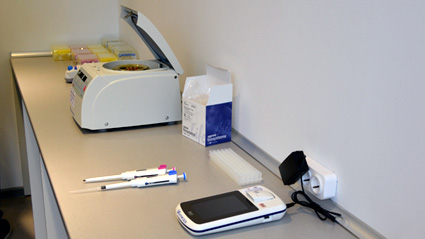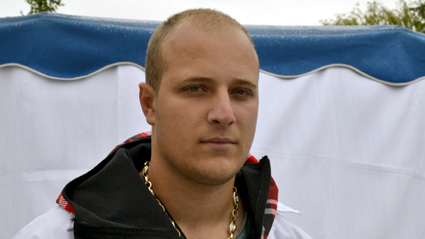Minister of Agriculture and Food Desislava Taneva and Director of the Swiss Federal Office for Agriculture (FOAG) Bernard Lehmann unveiled at a solemn ceremony the National DNA Analysis Genetic Lab. The funding for the lab equipment has been provided by the Bulgarian-Swiss Cooperation Programme under the Let’s Link Nature’s Protection with the Sustainable Development of Rural Areas Project. The lab can be found with the Executive Agency for Selection and Reproduction of Livestock Breeding in Sofia. It will help for the distinction of certain types of animals’ breeds via modern technologies. More from Minister Taneva:
 “This will also assist us in the creation of breeding programmes via the different associations for the raising of a certain breed, following the latest programmes. The animals selected will be highly productive according to the breed’s type and purpose – whether it is used for meat, milk etc. Bulgaria has extreme biodiversity in this aspect – many local, old, typically Bulgarian breeds, all kinds of animals, mostly sheep. We have selected 21 Bulgarian breeds so far. This set of tools, unveiled today at the National DNA Analysis Genetic Lab will give us a chance to find out the genes of each animal, raised in Bulgaria. This scientific method is the latest used by all developed countries in regard with livestock breeding. The lab is worth some EUR 250,000, no VAT included and is a part of the For the Balkan and the People project. The lab will allow us to have the best genetic control of animals, making sure they are precisely the ones we want.”
“This will also assist us in the creation of breeding programmes via the different associations for the raising of a certain breed, following the latest programmes. The animals selected will be highly productive according to the breed’s type and purpose – whether it is used for meat, milk etc. Bulgaria has extreme biodiversity in this aspect – many local, old, typically Bulgarian breeds, all kinds of animals, mostly sheep. We have selected 21 Bulgarian breeds so far. This set of tools, unveiled today at the National DNA Analysis Genetic Lab will give us a chance to find out the genes of each animal, raised in Bulgaria. This scientific method is the latest used by all developed countries in regard with livestock breeding. The lab is worth some EUR 250,000, no VAT included and is a part of the For the Balkan and the People project. The lab will allow us to have the best genetic control of animals, making sure they are precisely the ones we want.”
 Farmer Yane Kulov attended the unveiling of the new lab, offering part of his production. The man raises rare animal breeds: Karakachan Sheep, the Bulgarian Murra buffalo etc. He produces yoghurt, sheep and buffalo cheese. Here is what Yane says:
Farmer Yane Kulov attended the unveiling of the new lab, offering part of his production. The man raises rare animal breeds: Karakachan Sheep, the Bulgarian Murra buffalo etc. He produces yoghurt, sheep and buffalo cheese. Here is what Yane says:
“The lab is useful for all livestock breeders in Bulgaria. We can control the quality of the animals and the breed’s purity – whether it is real or not. Sometimes the papers say that everything is real and in fact the situation turns out to be a bit different…”
English version: Zhivko Stanchev
Photos: Luiza LazarovaDozens of enthusiasts and nature lovers will kick off the 44th edition of the Move and Win campaign with a spring hike to Bozhur Hut. The first walk will take place on 3 May. The meeting point will be the Vladishki Bridge in Veliko Tarnovo . The..
The third edition of the Samardala Festival will be held on 3 May in the central square of Nova Zagora. The aromatic plant, characteristic of south-eastern Bulgaria, is used as a spice and is harvested at the peak of its flowering in May, when the..
For the ninth year in a row, the Bulgarian Society for the Protection of Birds is organising the Let’s Count the Sparrows campaign . It takes place this Saturday, May 3, and anyone can take part by recording the number and types of sparrows they..
According to Bulgarian Orthodox tradition, it is customary on major Christian feast days to make a voluntary offering known as kurban. In general, this..
"Alphabet of Beer" is the first title I came up with 15 years ago, when I started collecting my beer stories," journalist of the..

+359 2 9336 661
